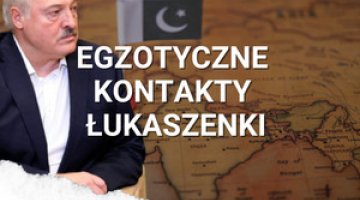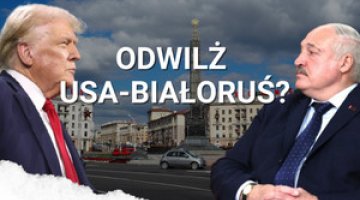Protest suspended – Belarusian society one year after the presidential elections

The progressive decline in living standards in Belarus and the authorities' dismissive attitude towards the COVID-19 pandemic have intensified public disillusionment with Alyaksandr Lukashenka. This led to an increase in the civic activity of Belarusians – previously seen as passive – in the campaign prior to the presidential election on 9 August last year. The revival of social life was accompanied by a growing national consciousness. Both processes mostly concerned the relations between the authorities and civil society, and to a lesser extent the geopolitical orientation, although later polls revealed the first signs of waning trust in Russia and a greater openness towards the West. The forged results of the vote this time gave rise to unprecedented protests, and the violent reaction by law enforcement only fuelled greater resistance among citizens. The lack of concessions shown by the authorities and the weariness of the demonstrators resulted in the demonstrations being brought to a halt at the end of 2020. At the same time, the authorities started to systemically and thoroughly eliminate independent media and third sector structures to discourage citizens from any manifestations of opposition. Despite the use of instruments characteristic of a totalitarian regime, there are numerous indications that the grievances have not been permanently suppressed. The Belarusian citizens who opposed the authorities last year mostly retained their pro-democratic views and aspirations to structure the state according to the Western model. They will rise rapidly to greater prominence as the oppressive regime backed by Russia continues to lose its credibility.
Civil awakening...
In the spring of 2020, seeking any alternative to replace Lukashenka, who has held power for 26 years, Belarusian citizens gave massive support to his opponents, including Viktar Babaryka, who was arrested in June last year, and Sviatlana Tsikhanouskaya, who was allowed to run for the presidency. In the opinion of a large part of Belarusian society, and particularly those who are better educated and earning a higher salary, the regime has become anachronistic, unable to meet their needs and create educational and professional development opportunities that meet their expectations.[1] Moreover, for politically and socially awakened Belarusians, it was important that new faces appeared on the political scene, both from outside the current system of power and aside from the old opposition associated with helplessness and never-ending disputes.[2] The dynamic and modern campaign led by Lukashenka's opponents was also encouraging. Hence, blatant election fraud aroused greater opposition than during previous elections. Demonstrations took place in the streets of many cities, and their brutal repression and torture of detained participants led to protests being escalated by outraged citizens. As a result, in the weeks that followed, resistance to the regime turned into both mass and peaceful demonstrations, sometimes reaching even a headcount of 200,000, as in the case of Minsk. These events were accompanied by numerous civic initiatives, launched both at the national level and within small neighbourhood communities, housing estates, etc. An important instrument for organising these events were chats on social networks, which, given the high popularity of the Internet in local cities, proved to be an excellent communication platform, integrating individual environments.
In this manner, Belarus’ previously apathetic society, deeply immersed in Soviet values and avoiding involvement in most political matters, entered a rapid process of transformation of consciousness and civic emancipation, based on a sense of dignity and the conviction of having the right to present the authorities their demands, rather than simply obeying orders and kowtowing to an authoritarian regime. On this basis, the protesters demanded the right to a sovereign choice of power, which was the main factor (besides opposition to repression) underlying the massive scale of demonstrations. A sense of interpersonal solidarity, previously absent on such a scale in social life, was also felt, and this fanned the emergence of various grassroots initiatives.[3] Independent Belarusian sociologists also pointed to the willingness of the protesters to maintaining sustained demonstrations, the lack of demand for centralised leadership and the active participation of citizens from all age groups (with an above average level of education) – these features made the Belarusian opposition movement unique.[4]
...and national awakening
Along with the growing civic maturity of Belarusians, it was possible to observe the development of their national consciousness. This was expressed, for instance, in the frequent use of forbidden white-red-white symbolism and singing national patriotic songs (not the official ones promoted by the regime's propaganda). This was followed by a change in historical consciousness, in which the Grand Duchy of Lithuania, and not the USSR, was increasingly becoming a point of reference for identifying one’s roots.[5] The widespread use of national symbols was not only a manifestation of patriotism, but also meant the pursuit of a modern model of public life, diverging from Soviet traditions, with a greater openness to the West and its democratic and free-market values. Moreover, although the polls[6] do not show a clear increase in anti-Russian attitudes so far, there are already some signs of criticism of the Kremlin's expansionist policy in the post-Soviet area. It should be noted, however, that the development of national awareness and civic activity did not apply to the entire society. There is still a group of about 20–30% of Lukashenka's more or less ideology-driven supporters, with rather poorer educational background, living in villages and small towns, who are willing to submit to a strong authority that makes decisions without their active participation. Thus, the post-election political crisis significantly deepened the previously inchoate division into supporters and opponents of the regime, i.e. two groups driven by completely different systems of values: on the one hand, supporters of change, conscious and independent, and on the other hand, people supporting the regime, advocating traditional state paternalism inherited from the USSR period.[7] At the same time, a significant part of the society (30 to 40%) distances itself from a political situation that is inciting increasingly fervent emotions among the populace.
The regime mounts a brutal counter-offensive
The regime immediately, upon election day, responded to street protests with mass repression against demonstrators and the leaders of the emerging opposition. Hundreds of people were imprisoned, and some of the opponents, including Lukashenka's main opponent, Sviatlana Tsikhanouskaya, were forced to emigrate. Over the past six months, Belarusian courts handed down thousands of prison sentences (usually from two to five years) to participants of last year's demonstrations, coordinators and users of the chat rooms criticising authorities, and even people displaying forbidden national symbols. Far more severe repression was employed against the leaders, including Lukashenka's would-be counter-candidate Viktar Babaryka, who was sentenced to 14 years in prison on 6 July – the highest penalty in the history of independent Belarus for a political opponent of the regime and a clear warning to any citizens critical of the authorities. As a result, the number of political prisoners has been growing steadily and now stands at 560 people, and Belarusian human rights defenders are constantly reporting further displays of repression.[8] In addition, the regime implemented a number of legal measures (the largest package of changes was adopted in May 2021) significantly restricting the right of citizens to strike and organise public assemblies. Independent journalists, already facing numerous restrictions, also took a hit, since regulations on combating extremism were extended; also, attempts were made to “rehabilitate” Nazism, in both cases defined broadly enough to be flexibly applied to all independent environments.[9]
In May, the regime also began launching a comprehensive plan to systematically destroy the structures of Belarusian civil society, the independent media, the political opposition, and even the independent expert community. The blocked entities included two popular and well-recognised information portals – Tut.by and Nasha Niva. The activities of many editorial offices, including Belsat TV in July 2021, were considered extremist, and the dissemination of their materials, even via posts on social networks, will be considered a criminal offence. In July, the courts began a wholesale closure of registered NGOs, including those outside the political or human rights sectors. By forcing a Ryanair plane to land in Minsk on 23 May 2021 and arresting the radical opposition journalist Raman Pratasyevich on board, the regime demonstrated its strength and launched a campaign to discredit and divide the opposition. As a result, virtually any activity beyond the limits set forth by the authorities entailed a risk of repression, and Belarusian authoritarianism began to evolve towards a totalitarian system.
The adoption by the opposition of white-red-white symbolism (previously tolerated by the regime), and the historical heritage related to it caused a radical change in the propaganda narrative of the authorities. They noticed the great mobilisation potential vested in national symbols for the organisation of civic opposition and reacted with an intense media campaign accusing Lukashenka's opponents of pro-fascist sympathies, betrayal of the homeland and collaboration with the state's "external enemies" (references were made here to the instances of using these flags by Belarusian organisations cooperating with the German occupier during World War II). An aggressive campaign of slandering the Belarusian independence tradition, abundant in abuses and historical lies, has become an additional factor for intimidating a fractious citizenry.[10]
Internal and external emigration of the dissatisfied
The lack of concessions from the authorities and the fatigue brought on by sustained protests, as well as unfavourable weather conditions, led to a gradual dissipation of protest activities by the end of 2020. In the first months of 2021, in the Belarusian independent media space, there was a widespread view of a "hot spring" that would bring about a resumption of street activity by rebellious citizens. The turning point was to be the annual celebration of Freedom Day on 25 March – an illegal holiday celebrated by opposition groups related to the anniversary of the 1918 proclamation of the Belarusian People's Republic. Despite the calls of the leaders of the protest movement abroad – Sviatlana Tsikhanouskaya and Pavel Latushka – no organised demonstration took place, which is an unprecedented situation in the entire history of the celebration of this anniversary. The regime made any potential actions so costly that it cowed even the most active opponents into staying at home.[11] An important factor in demobilising Belarusians was, and continues to be, not only fear, but also the current lack of conviction that public manifestation of opposition will not lead to re-elections or any changes in the internal policy of the state.[12] Hence, one can talk about the internal emigration of this significant part of society that remains in the country, maintaining its critical assessment of the authorities without disclosing it to the public.
In addition to repressions directly affecting opponents, the regime is also trying to isolate society from the West to an ever greater extent – both by limiting the possibility of leaving the country via land border crossings under the pretext of combating COVID-19 (only air connections from Minsk are available, although those to Western Europe have been significantly reduced as a result of EU sanctions), as well as by the gradual eradication of foreign cultural and educational institutions (e.g. the German Goethe Institute and the Academic Exchange Service)[13]. Nevertheless, the high level of Internet access in Belarus (over 70% of the population uses the Internet) allows for almost universal access to alternative information in spite of the government's countermeasures, and prevents those Belarusians who are politically active to some degree from being completely shut off from the outside world.
Additionally, not only does the regime make it difficult for some citizens to go abroad, but it also indirectly encourages them to do so through repressive measures (unless there are special legal circumstances, e.g. court proceedings are not pending) – this applies to acknowledged opponents, independent journalists, and social activists who increasingly frequently decide to emigrate for fear of reprisals. From the point of view of the authorities, the outflow of the most socially active people weakens the protest movement in the country and also reduces the potential of civil society. Representatives of Belarusian government structures avoid public assessments of the economic, social and demographic effects of the forced emigration seen since October 2020, often of highly skilled specialists (e.g. from the IT industry) – probably so as to further obscure the scale of the problem. The Migration Department under the Ministry of the Interior has ceased to provide data on the movement of people and only releases general announcements.[14] It is worth noting that the population of Belarus decreased by over 60,000 in 2020 (including by 10,000 in Minsk), while in 2019 it dropped by only 18,000.[15] It seems that, apart from the higher mortality rate related to COVID-19 (hidden in official announcements of the Ministry of Health), the wave of political emigration could have been an important factor causing such a significant demographic decline.
What is society ready for?
As a result of restrictive regulations and pressure from the regime, even before the beginning of the post-election crisis, conducting independent sociological research in Belarus was seriously hampered, and even impossible in the sphere of political preferences. Partial data is provided by online surveys on a sample of about 900 residents of Belarusian cities, repeated several times after 9 August 2020, commissioned by the British think tank Chatham House. Limiting the respondents to urban network users only prevents reaching the often less socially active and less educated supporters of the regime in the provinces. On the other hand, this research provides a relatively reliable picture of the sentiments among that part of society that formed the backbone of the protest movement from the onset of street demonstrations. Comparison of the results of surveys from September 2020 and April 2021 (the last survey conducted to date) indicates a gradual decline in the number of respondents supporting the demonstrations – from 44% to 36%, which is a natural consequence of disillusionment with the lack of political results from previous demonstrations and a fear of participation in subsequent rallies. At the same time, the majority of respondents support the notion of change in Belarus, including the organisation of free elections, the release of political prisoners and the cessation of violence (64%), as well as a fair, transparent reckoning of all crimes and abuses against demonstrators committed by law enforcement authorities in 2020 (72%). The vast majority also demands the departure of Alyaksandr Lukashenka, and only 10% would like to extend his rule for another term.[16]
This indicates that a significant proportion of citizens participating in last year's protests or sympathising with the opposition movement maintain their pro-democratic views, therefore showing that the process of transformation of a large part of Belarusian society and the consequent loss of the regime's social credibility is irreversible. As a result, the demonstrations of the still dissatisfied Belarusians may gradually resurface under more favourable circumstances, e.g. along with a reduction in the intensity of repression or a radical decline in living standards, related to the possible collapse of the economy, which is on the brink of recession and burdened with Western sanctions. The signing of the currently negotiated package of Russian-Belarusian agreements on deep integration within the Union State, which is perceived by some citizens in terms of loss of sovereignty, may also trigger street protests. Another important factor in this context will be the cohesiveness of the Belarusian nomenklatura, as it seems unchallenged at the moment, which may be undermined by the ever-increasing sanctions imposed by the West and, above all, by pressure from the Kremlin. It is also noteworthy that eliminating media outlets and social organisations and forcing them underground may result in their radicalisation, which will increase social tensions and the related risk of spontaneous, civil rebellion with nobody at the helm.
[1] See the interview with the Belarusian sociologist Oksana Shelest: ‘«Голос улиц»: социология белорусского протеста’, Rfi, 19 October 2020, rfi.fr/ru.
[2] K. Kłysiński, ‘Belarus: a wave of social discontent before presidential elections’, OSW, 1 June 2020, osw.waw.pl.
[3] О. Шелест, ‘Поверили, что невероятные. Как изменились белорусы за прошедший год?’, Deutsche Welle, 17 May 2020, dw.com/ru.
[4] А. Вардомацкий, ‘Андрей Вардомацкий об уникальном опыте белорусского протеста’, Thinktanks.by, 25 February 2021, thinktanks.by.
[5] See ‘Belarusians on Poland, Russia and themselves. Analysis of a public opinion poll commissioned by the Centre for Eastern Studies’, OSW Commentary, no. 373, 29 January 2021, osw.waw.pl.
[6] For instance in the research commissioned by the Centre for Eastern Studies, as well as Chatham House, quoted in the text.
[7] М. Богданова, ‘Андрей Вардомацкий: Уровень образования сторонников перемен выше среднего по стране’, Белорусы и Рынок, 4 March 2021, belmarket.by.
[8] See data of the Belarusian Human Rights Center "Viasna" (Праваабарончы цэнтр «Вясна», spring96.org).
[9] K. Kłysiński, P. Żochowski, ‘The legalisation of terror. The Belarusian regime expands the legal basis for repression’, OSW, 21 May 2021, osw.waw.pl.
[10] В. Можейко, ‘Нарратив белорусской госпропаганды: все, кто против — фашисты’, Naviny.by, 3 July 2021, naviny.online.
[11] А. Класковский, ‘После Дня Воли. Вздохнет ли Лукашенко с облегчением?’, Naviny.by, 27 March 2021, naviny.online.
[12] See an interview with a Belarusian analyst, journalist Artyom Shraibman: Е. Прокофьева, ‘Возросшая цена протеста. Почему белорусы не вышли на улицы 9 мая?’, Радио Свобода, 9 May 2021, svoboda.org.
[13] ‘Белорусские власти требуют прекращения деятельности Института Гёте и DAAD в Беларуси’, Белрынок, 30 June 2021, belrynok.by.
[14] In October 2020 the Belarusian Interior Ministry admitted that nearly 14,000 people left the country in less than two months after the presidential election, of which as much as 10,000 travelled to Poland. See С. Ромашенко, ‘МВД Беларуси сообщило о выезде 13 тысяч белорусов в Польшу и Украину’, Deutsche Welle, 21 October 2020, dw.com/ru.
[15] ‘Год пандемии: население Беларуси за 2020 год сократилось на 60 тысяч’, Reformation, 9 April 2021, reform.by. Currently, Belarus is inhabited by over 9.3 million people.
[16] See R. Astapenia, ‘What Belarusians Think About Their Country’s Crisis’, Chatham House, 21 October 2020, chathamhouse.org; Взгляды белорусов на политический кризис, Chatham House, 14 June 2021, chathamhouse.org.





